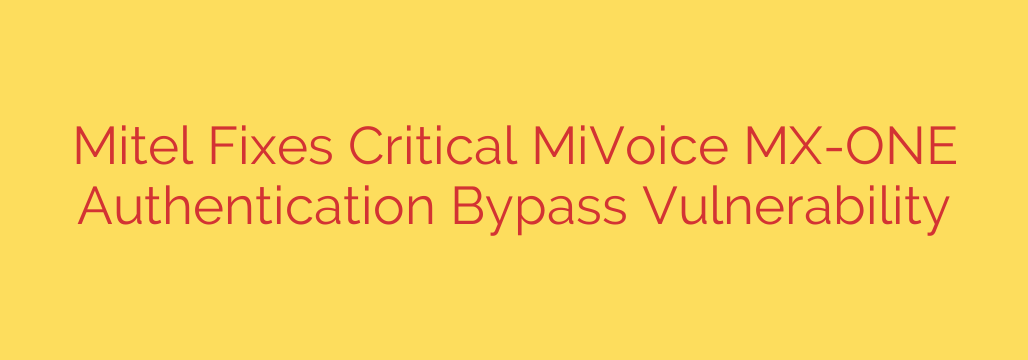
Critical Vulnerability in Mitel MiVoice MX-ONE: What You Need to Know and How to Fix It
A critical security flaw has been discovered in Mitel’s MiVoice MX-ONE, a widely used unified communications platform. This vulnerability, tracked as CVE-2023-40854, carries a severity score of 9.8 out of 10, placing it in the highest risk category.
This flaw allows an unauthenticated remote attacker to bypass security measures and gain privileged access to the system. If your organization uses this platform, it’s crucial to understand the risk and take immediate action to protect your communications infrastructure.
Understanding the Threat: The Authentication Bypass Flaw
At its core, CVE-2023-40854 is an authentication bypass vulnerability affecting the web-based management interface of the MiVoice MX-ONE solution.
By sending a specially crafted HTTP request to the server, a malicious actor can trick the system into granting them administrative privileges. This means an attacker doesn’t need any prior access or credentials to execute the attack. The exploit can be launched remotely, requiring no user interaction, making it particularly dangerous.
Once an attacker gains this level of access, they can achieve a complete system takeover.
The Potential Impact on Your Business
The consequences of a successful exploit are severe and can have a significant impact on business operations. An attacker with administrative control over your communications system could:
- Disrupt Critical Communications: Shut down phone services, block incoming or outgoing calls, and cause major operational outages.
- Eavesdrop on Sensitive Conversations: Intercept and listen to private phone calls, potentially exposing confidential business strategies, client information, or financial data.
- Steal Data: Access call logs, user directories, voicemails, and other sensitive information stored on the system.
- Launch Further Attacks: Use the compromised communications server as a pivot point to launch attacks against other systems within your internal network.
In short, a successful attack could lead to a complete compromise of your organization’s voice communication security and integrity.
Which MiVoice MX-ONE Versions Are at Risk?
This critical vulnerability affects a specific range of Mitel MiVoice MX-ONE versions. You are at risk if your system is running any of the following releases:
- Mitel MiVoice MX-ONE versions 7.0 to 7.4 SP2
If your system falls within this range, you should consider it vulnerable and prioritize immediate remediation.
Actionable Steps: How to Protect Your System
Mitel has acknowledged the vulnerability and released a security patch to address it. To secure your infrastructure, follow these essential steps immediately.
- Patch Immediately: The most important step is to apply the security update provided by Mitel. The vulnerability is resolved in Mitel MiVoice MX-ONE version 7.4 SP3 and later releases. Contact your Mitel support partner to schedule the update as soon as possible.
- Restrict Access to the Management Interface: As a fundamental security best practice, your system’s management interface should never be exposed to the public internet. Ensure that access is restricted to a secure, internal network or a trusted administrative VPN. This step alone significantly reduces the risk of an external attack.
- Monitor for Suspicious Activity: Review your system logs for any unusual or unauthorized access attempts, especially targeting the management interface. Look for unexpected configuration changes or new administrative accounts that you do not recognize.
VoIP and unified communications systems are high-value targets for threat actors due to the critical role they play in business. Taking proactive steps to patch vulnerabilities and implement strong security controls is not just recommended—it’s essential for protecting your organization’s assets and reputation.
Source: https://securityaffairs.com/180345/security/mitel-patches-critical-mivoice-mx-one-auth-bypass-flaw.html








